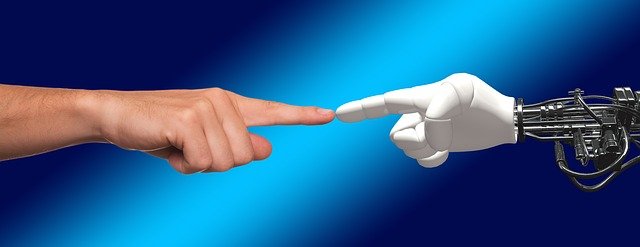
Tech Engineer Starts New Church to Worship AI
Article Header
« Return to Main PageTech Engineer Starts New Church to Worship AI
Tech engineering mastermind Anthony Levandowski, formerly an executive with both Google and Uber, claims to be serious about starting a religion based on artificial intelligence. This new church, “Way of the Future,” will focus on “the realization, acceptance and worship of a Godhead based on Artificial Intelligence (AI) developed through computer hardware and software.”
Apparently, AI deserves to be worshipped as God because, according to Levandowski, it will eventually be many times smarter than humans. In an interview he says, “It’s not a god in the sense that it makes lightning or causes hurricanes. But if there is something a billion times smarter than the smartest human, what else are you going to call it?”
He goes on to say, regarding the development of AI technology, “We’re in the process of raising a god. So let’s make sure we think through the right way to do that. It’s a tremendous opportunity.” Like other religions Levandowski hopes to have a “gospel,” which he calls “The Manual,” a liturgy, and perhaps even a physical place of worship.
According to another source, Levandowski added,
Part of it being smarter than us means it will decide how it evolves, but at least we can decide how we act around it…I would love for the machine to see us as beloved elders that it respects and takes care of. We would want this intelligence to say, ‘Humans still have rights, even though I’m in charge.’
A New Religion?
News reports are claiming this is a “new religion” but it’s really just another variation on one of the oldest religions out there—man creating something and calling it “god.” It’s just another man-made religion that looks to man’s creation, rather than the God who made mankind, for meaning, purpose, and hope. The Old Testament talks about the foolishness of these religions:
The idols of the nations are silver and gold,
the work of human hands.
They have mouths, but do not speak;
they have eyes, but do not see;
they have ears, but do not hear,
nor is there any breath in their mouths.
Those who make them become like them,
so do all who trust in them. (Psalm 135:15-18)
Now an AI god will be much more sophisticated than the bronze, silver, or gold idols the nations around Israel would bow down and worship. It may even appear that AI can hear and respond to us. But are we any less foolish than these pagan nations to worship something we have created with our own hands and God-given intellect, no matter how incredible the thing we’ve crafted is?
Levandowski would do well to heed God’s instruction:
You shall not make for yourself a carved image, or any likeness of anything that is in heaven above, or that is in the earth beneath, or that is in the water under the earth. You shall not bow down to them or serve them, for I the Lord your God am a jealous God, visiting the iniquity of the fathers on the children to the third and the fourth generation of those who hate me, but showing steadfast love to thousands of those who love me and keep my commandments. (Exodus 20:4-6)
Smarter = God?
Levandowski is equating intelligence with being god. Of course, as evidenced by His creation, the God of the Bible is infinitely intelligent (far more so than AI will ever be) but He’s much more than that. He isn’t God because He’s smart—He’s God because He’s divine by His very nature. His qualities (such as intelligence, omnipotence, omnipresence, etc.) flow out of his divine nature; they aren’t what make God “God.”
We can craft AI to become much more intelligent than we are. In some ways, we’ve already done that and there’s likely much (much!) more to come. But we won’t be creating God any more than the pagan nations that carved idols were creating gods. You see, we are made in God’s image, gifted with intelligence, and given the duty to rule over the earth. Part of how we do that is through developing technologies, using what God has made. When we create AI (among other technologies) we are creating something in our image, just as God has created us in His image. We’re just copying our Creator!
A New Hope
We shouldn’t put our hope in man’s technologies or we will ultimately be disappointed. While many aspects of AI will be used for good, we can be assured that in a sin-cursed and broken world, filled with men and women in rebellion against God, AI also has the potential to be used for evil. The technology itself isn’t good or evil—it’s how we use it that is. And eventually we will be disappointed with how it is used or even its limitations.
Hope, meaning, and purpose for humanity doesn’t rest in developing AI to rule the world. AI may indeed help us temporarily fight some of the effects of the Curse but it won’t save us. Our biggest problem isn’t something AI can solve—we can’t even solve it!
Our biggest problem is that we’re sinners; “for all have sinned and fall short of the glory of God” (Romans 3:23). We’ve broken God’s law and deserve the just penalty for our sins—death; “for the wages of sin is death” (Romans 6:23).
But Jesus Christ stepped into history and took that penalty for us. He died in our place and rose from the grave, conquering sin and death, and now offers the free gift of eternal life to all who will believe and trust in Him. Our biggest problem has been solved through Christ! And that’s true hope, meaning, and purpose that will last for all eternity—long after Levandowski’s AI god has been shown for what it is, a false god that cannot save.
Learn more about a biblical view of AI in my article from Answers magazine: “Artificial Intelligence: Better than Humans?”








